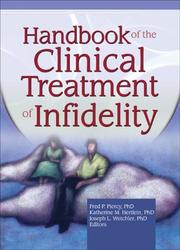| Listing 1 - 10 of 48 | << page >> |
Sort by
|

ISBN: 113644095X 0203051424 129928700X 1136440887 9781136440885 0789029944 9780789029942 0789029952 9780789029959 Year: 2011 Publisher: New York : Routledge,
Abstract | Keywords | Export | Availability | Bookmark
 Loading...
Loading...Choose an application
- Reference Manager
- EndNote
- RefWorks (Direct export to RefWorks)
Help your clients' relationships survive infidelity!In the Handbook of the Clinical Treatment of Infidelity, a panel of seasoned experts reflects on issues central to affairs, and on how to help couples heal and learn from them. First, editors Fred P. Piercy, Katherine M. Hertlein, and Joseph L. Wetchler provide an essential overview of infidelity theory, research, and treatment. They discuss the effect of infidelity on couples and delineate three types of infidelity?emotional, physical, and infidelity including aspects of both. They review the relatively new role of the Internet i
Marital psychotherapy. --- Adultery --- Treatment.

ISBN: 0791485919 1417537434 9781417537433 079145911X 9780791459119 0791459128 9780791459126 9780791485910 Year: 2003 Publisher: New York : State University of New York Press,
Abstract | Keywords | Export | Availability | Bookmark
 Loading...
Loading...Choose an application
- Reference Manager
- EndNote
- RefWorks (Direct export to RefWorks)
A scandalous bestseller of mid-nineteenth-century France, translated here for the first time into English.
Adultery --- Painters --- France --- Social life and customs

ISBN: 1283848317 0199938113 9780199938117 0720619149 9780720619140 9780199938797 0199938792 0195103092 9780195103090 0195103084 9780195103083 9896602352 8074840239 0520007905 0720618754 0720619122 0720619130 8582850352 0140446125 0197723829 Year: 1997 Publisher: New York : Oxford University Press,
Abstract | Keywords | Export | Availability | Bookmark
 Loading...
Loading...Choose an application
- Reference Manager
- EndNote
- RefWorks (Direct export to RefWorks)
"At last, a new translation of Machado's masterpiece that is complete (unlike Scott-Buccleuch's 1992 version - see HLAS 54:5078 - which omitted key chapters) and highly readable. Gledson produces a much-needed, graceful and accurate translation, attentive to Machado's tone and rhythms. Hansen's Afterword is excellent"--Handbook of Latin American Studies, v. 58.
Reminiscing in old age --- Adultery --- Authorship --- Catholics
Book
ISBN: 0813166497 0813166489 9780813166483 9780813166490 9780813166476 0813166470 Year: 2016 Publisher: Lexington, Kentucky : University Press of Kentucky,
Abstract | Keywords | Export | Availability | Bookmark
 Loading...
Loading...Choose an application
- Reference Manager
- EndNote
- RefWorks (Direct export to RefWorks)
Book
ISBN: 1949481093 Year: 2019 Publisher: Las Vegas, Nevada : Central Recovery Press,
Abstract | Keywords | Export | Availability | Bookmark
 Loading...
Loading...Choose an application
- Reference Manager
- EndNote
- RefWorks (Direct export to RefWorks)
Women --- Men --- Betrayal --- Adultery --- Psychology. --- Sexual behavior. --- Psychological aspects.
Book
ISBN: 9780810133990 0810133997 9780810133976 0810133970 9780810133983 0810133989 Year: 2016 Publisher: Evanston, Illinois Northwestern University Press
Abstract | Keywords | Export | Availability | Bookmark
 Loading...
Loading...Choose an application
- Reference Manager
- EndNote
- RefWorks (Direct export to RefWorks)
In Adulterous Nations, Tatiana Kuzmic enlarges our perspective on the nineteenth-century novel of adultery and how it often served as a metaphor for relationships between the imperial and the colonized. In the context of the long-standing practice of gendering nations as female, the novels discusse-Eliot's Middlemarch, Fontane's Effi Briest, and Tolstoy's Anna Karenina, along with Enoa's The Goldsmith's Gold and Sienkiewicz's Quo Vadis-can be understood as depicting international crises on the scale of the nuclear family. Kuzmic argues that the hopes, anxieties, and interests of European nations in this period can be discerned in the destabilizing force of adultery. Reading the work of Enoa and Sienkiewicz, Kuzmic illuminates the relationship between the literature of dominant nations and that of the semicolonized territories that posed a threat to them. Kuzmic's study enhances our understanding of not only these novels but nineteenth-century European literature more generally.
Nationalism in literature. --- Adultery in literature. --- European fiction --- History and criticism. --- Literature --- Adultery --- George Eliot --- Leo Tolstoy --- Middlemarch --- Poland --- Russia

ISBN: 1281346519 0191517887 1429498544 9780191517884 9780192840394 0192840398 9780192805492 0192805495 9781281346513 9786611346515 6611346511 0192805495 0192840398 0191920460 Year: 2020 Publisher: Oxford : Oxford University Press,
Abstract | Keywords | Export | Availability | Bookmark
 Loading...
Loading...Choose an application
- Reference Manager
- EndNote
- RefWorks (Direct export to RefWorks)
Flaubert's novel scandalized its readers when it was first published in 1857, and it remains unsurpassed in its unveiling of character and society. In this new translation, Margaret Mauldon captures the tone that makes Flaubert's style so distinct and admired.
Adultery. --- Literature. --- French Literature --- Romance Literatures --- Languages & Literatures --- Bovary, Emma --- France --- Social life and customs
Film

Year: 2019 Publisher: New York, NY Kino Lorber
Abstract | Keywords | Export | Availability | Bookmark
 Loading...
Loading...Choose an application
- Reference Manager
- EndNote
- RefWorks (Direct export to RefWorks)
A man is convinced he met an enigmatic woman the previous year at the same location, and perhaps had a flirtation. A second man, possibly the woman's lover or husband, repeatedly intimidates the first man. Their relations unfold through flashback shards that never quite fit into place, their lives a hall of mirrors that never reveal a true self.
Adultery --- Health resorts --- Man-woman relationships --- False memory syndrome --- Married women

ISBN: 0224052519 0224061143 9780224052511 9780224061148 Year: 1999 Publisher: London Cape
Abstract | Keywords | Export | Availability | Bookmark
 Loading...
Loading...Choose an application
- Reference Manager
- EndNote
- RefWorks (Direct export to RefWorks)
The English in France, fat and slim, then and now. Many familiar ingredients of the novel are given new form in a unique graphic form, as Gemma's sudden windfall and distaste for London take them across the Channel to Normandy wher the charms of French country living soon wear off.
741.571 SIMMONDS --- beeldverhaal --- eenentwintigste eeuw --- graphic novels --- Groot-Brittannië --- kunst --- Simmonds Posy --- strips --- tekenkunst --- English literature --- Simmonds, Posy --- Adultery --- Adultery. --- Simmonds, Posy. --- France --- 891 --- auteursstrips --- bandes dessinées d_auteur --- Literatuur, muziek en beeldende kunst/grafiek (kennisdomein)
Book
ISBN: 9789492444080 9492444089 9492444208 9789492444202 Year: 2016 Volume: 21 Publisher: Groningen, [Netherlands] : Barkhuis : Groningen University Library,
Abstract | Keywords | Export | Availability | Bookmark
 Loading...
Loading...Choose an application
- Reference Manager
- EndNote
- RefWorks (Direct export to RefWorks)
From Bedroom to Courtroom? argues that the fictional trial scenes in the Greek ideal romances reflect Roman legal institutions and ideas, particularly relating to family and sexuality. Given the genre's emphasis on love and chastity, the specter of adultery looms over most of the scenarios that develop into elaborate trials. Such scenes shed light on the Greek reception of the criminalization of adultery promulgated by the moral legislation during the reign of Augustus. This book focuses on three major novels whose composition coincided with the extension of Roman citizenship when access to Roman courts was granted to increasing numbers of inhabitants of the eastern provinces of the Roman Empire.
Roman law --- Law in literature. --- Adultery (Roman law) --- Law --- Influence. --- Roman influences --- History --- Chariton. --- Achilles Tatius. --- Heliodorus, --- Criticism, Textual.
| Listing 1 - 10 of 48 | << page >> |
Sort by
|

 Search
Search Feedback
Feedback About UniCat
About UniCat  Help
Help News
News